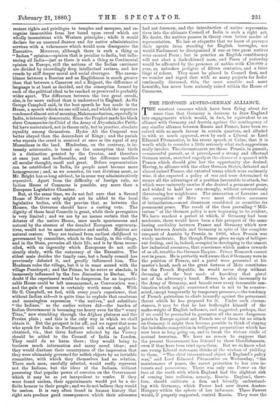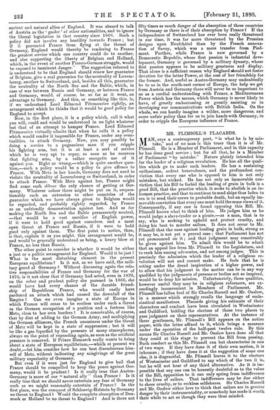THE PROPOSED AUSTRO-GERMAN ALLIANCE. T HE constant rumours which have been
flying about for some time that Germany is desirous to draw England into engagements which would, in fact, be equivalent to an alliance with Germany and Austria against the contingency of any similar alliance between Russia and France, have been re- ceived with so much favour in certain quarters, and alluded to with so much approval, even by such a Liberal as Lord Edmond Fitzmaurice, in his recent speech at Caine, that it is worth while to consider a little seriously what such suggestions really involve. The circumstances are these. Prussia, in pursuit, —successful pursuit, as it proved,—of a strong and effectual German union, snatched eagerly at the chance of a quarrel with France which should give her the opportunity she desired. Having, in alliance with the other German States, defeated and almost ruined France, she extorted terms which were eminently wise, if she expected a policy of war and were determined to secure all the advantages of a position favourable to attack, but which were eminently unwise if she desired a permanent peace, and wished to hold her own strongly, without ostentatiously threatening her neighbours. The annexation of Lorraine and the occupation of Metz were most effective measures of intimidation,—most disastrous considered as securities for permanent peace. The result of the then prevailing " Mili- tarism " of the German policy is now beginning to be evident. We have reached a period at which, if Germany had been moderate, there would have been a fair prospect of the same lasting cordiality between France and Germany which now exists between Austria and Germany in spite of the complete conquest of Austria by Prussia in 1866, when Prussia was wisely moderate. But though France gives no sign of belliger- ent feeling, and is, indeed, occupied in developing to the utmost her industrial resources, that conscience which makes cowards of us all, troubles the German Empire. Prince Bismarck cannot rest in peace. He is perfectly well aware that if Germany were in the position of France, and a pistol were presented at his master's head, such as the great fortress of Metz constitutes for the French Republic, he would never sleep without dreaming of the best mode of knocking that pistol out of his adversary's hand. Hence, he adds incessantly to the Army of Germany, and broods over every favourable con- bination which might counteract what is not to be counter- acted, except temporarily by temporary pressure,—the tendency of French patriotism to chafe inwardly against the permanent threat which he has prepared for it. Under such circum- stances, it may be that he has bethought himself of the make-weight of English influence, and suggested, perhaps, that if we could be persuaded to guarantee all the more dangerous points in Europe against any French use of them for an attack on Germany, it might then become possible to think of staying the indefinite competition in belligerent preparations which has now been so long going on, and to break the vicious circle of mutual terrorism. We have no reason to suppose that the present Government has listened to these blandishments, even if they have been tried upon them. But we do know what one young Liberal statesman thinks of the wisdom of yielding to them. "The chief international object of England's policy was," said Lord Edmond Fitzmaurice on Wednesday, "the maintenance of peace, the surest protection to her own in- terests and possessions. There was only one Power on the face of the earth with which England had the slightest risk of coming into collision, namely, Russia. England, there- fore, should cultivate a firm and friendly understand- ing with Germany, which Power had now drawn Austro- Hungary within the sphere of her influence. These Powers would, if properly supported, control Russia. They were the ancient and natural allies of England. It was absurd to talk of Austria as the 'gaoler' of other nationalities, and to ignore the liberal legislation in that country since 1866. Such a policy did not involve any hostility towards France ; but if it prevented France from flying at the throat of Germany, England would thereby be rendering to France the greatest service which one country could do to another, and also supporting the liberty of Belgium and Holland, which, in the event of another Franco-German struggle, would be exposed to imminent danger." The suggestion referred to is understood to be that England should renew her guarantee of Belgium, give a real guarantee for the neutrality of Luxem- bourg, another to Switzerland, and, besides all this, guarantee the neutrality of the North Sea and the Baltic, which, in case of war between Russia and Germany, or between France and Germany, would, of course, be, so far as it went, an advantage to Germany. And this, or something like this, is, if we understand Lord Edmond Fitzmaurice rightly, an arrangement which he thinks that it would be good policy for England to accept.
Now, in the first place, it is a policy which, call it what you will, could and would be understood in no light whatever but that of an attempt to hamper France. Lord Edmond Fitzmaurice virtually admits that when he calls it a policy which would render it impossible for France, under any even- tualities, to attack Germany. Now, you may possibly be doing a service to a pugnacious man if you cripple his fighting arm, but it is at least a sort of service which he is very apt to repay, so soon as he recovers that fighting arm, by a rather energetic use of it against you. Right or wrong,—which is quite another ques- tion,—such a policy would be a policy to give offence to France. With Metz in her hands, Germany does not need to violate the neutrality of Luxembourg or Switzerland, in order to attack France. With Metz against her, France might find some such detour the only chance of getting at Ger- many. Whatever colour there might be put on it, unques- tionably such an extension to other countries of the guarantee which we have always given to Belgium would be regarded, and probably rightly regarded, by France as an unfriendly demonstration against her. And as for making the North Sea and the Baltic permanently neutral, —that would be a vast sacrifice of English power, if it were to hold good against ourselves, and a most .open threat at France and Russia, if it were to hold good only against them. The first point to notice, then, is that, explain it as you might, this arrangement would be, and would be generally understood as being, a heavy blow at France, no less than Russia.
The other point to consider is whether it would be either a just or a politic arrangement for England. Would it be just ? What is the most disturbing element in the present European equilibrium? Is it not, as we have said, the mili- tary greed of Germany ? Without discussing again the rela- tive responsibilities of France and Germany for the war of 1870, is it not clear that if Germany had acted, even in 1870, on the sober and prudent policy she pursued in 1866, she would have had every chance of the durable friend- ship of Republican France, who would easily have pardoned an attack which had caused the downfall of the Empire ? Can we even imagine a state of Europe in which France will cease to be restless under such a threat as the German occupation of a position and a fortress like Metz, close to her own borders ? It is conceivable, of course, that by dint of adding to the German Army, and multiplying the German alliances, the French uneasiness under the threat of Metz will be kept in a state of suppression ; but it will be like a gas liquefied by the pressure of many atmospheres, always on the point of expanding again, so soon as the artificial pressure is removed. If Prince Bismarck really wants to bring about a state of European equilibrium,—which at present we doubt,—let him consider how he can best disembarrass him- self of Metz, without indicating any misgivings of the great military superiority of Germany. But even if it were just for England to give bail that France should be compelled to keep the peace against Ger- many, would it be prudent ? Is it really true that Austro- Germany is more of our "natural ally" than France ? Is it really true that we should never entertain any fear of Germany such as we might reasonably entertain of France ? In the first place, was the conquest of Schleswig-Holstein by Germany no threat to England? Would the complete absorption of Den- mark or Holland be no threat to England? And is there not fifty times as much danger of the absorption of these countries by Germany as there is of their absorption by France ? If the independence of Switzerland has ever been really threatened in our time, it was far more threatened by the Prussian designs upon Neufchaltel than by the French annexa- tion of Savoy, which was a mere transfer from Pied- mont. Further, while France is now governed by a Democratic Republic, whose first passion is industrial deve- lopment, Germany is governed by a military dynasty, whose first passion appears to be military greatness and display. That alone is a sufficient reason why England should not foster devotion for the latter Power, at the cost of her friendship for the former. And, useful as Austro-Germany may undoubtedly be to us in the south-east corner of Europe, the help we get from Austria and Germany there will never be so important to us as a cordial understanding with France, a Mediterranean Power which has the means, which Germany is never likely to have, of greatly embarrassing or greatly assisting us in developing our communications with British India. On the whole, we can hardly imagine a wilder, more dangerous, and more unfair policy than for US to join hands with Germany, in order to cripple the European influence of France.



































 Previous page
Previous page